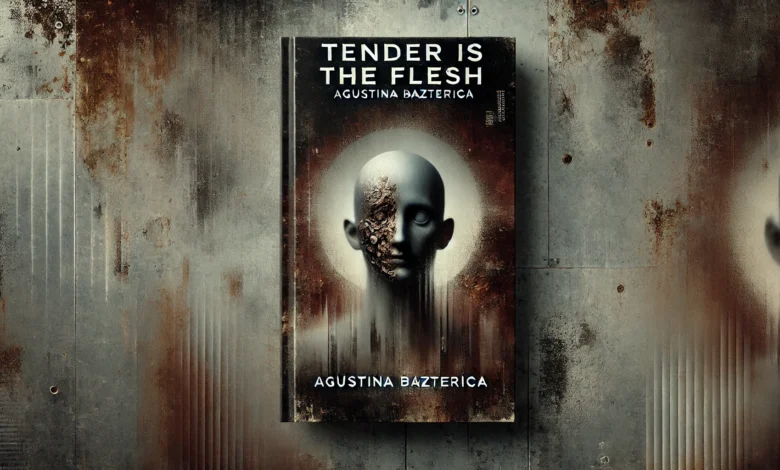What Is ‘Tender Is the Flesh’ About? A Complete Summary and Analysis

Introduction: What Is ‘Tender Is the Flesh’ About?
Imagine a society where the most basic human rights have been stripped away, where human beings are commodified, bred, and slaughtered as livestock to satisfy a cannibalistic market. This is the chilling premise of Agustina Bazterrica’s novel “Tender Is the Flesh”, a dystopian exploration of a world where the boundaries of morality, ethics, and humanity are not just tested—they are obliterated.
In this blog post, we will dive deep into the unsettling world of “Tender Is the Flesh”—unpacking the novel’s plot, themes, characters, and symbolism. More importantly, we will explore how Bazterrica’s disturbing narrative serves as a bold commentary on contemporary society’s attitudes toward exploitation, consumerism, and dehumanization. Whether you’ve already read the novel or are considering picking it up, this analysis will provide valuable insight into why “Tender Is the Flesh” has become a thought-provoking, controversial, and essential read in modern dystopian fiction.
A Summary of ‘Tender Is the Flesh’: The Setting and Premise
At the heart of “Tender Is the Flesh” is a deeply disturbing world in which humans have lost their legal and moral standing as individuals. Following a mysterious virus that makes animal meat unsafe for consumption, humanity turns to an alternative source: human flesh. In this dystopian society, the government has established a brutal system where humans—now referred to as “the others”—are bred for slaughter, their lives reduced to mere commodities.
Marcos, the novel’s protagonist, works at a processing plant where humans are raised and butchered for their meat. He is part of a society that views this system as normal and essential for survival. The language of the novel is stark and clinical, reflecting the dehumanization at the core of this world. Humans are reduced to a specific category: livestock for consumption. The term “meat” is used for people as if they are objects, their identity stripped away as they are bred, processed, and slaughtered.
Marcos, who once had a family and a life outside this industry, finds himself caught between personal trauma and his complicity in this system. The novel begins with a description of “the others”, who are referred to as products, their worth determined by their market value. Marcos’s world is one of extreme violence and ethical dissonance—his job involves overseeing the production and distribution of human flesh. Yet, his inner conflict intensifies as he confronts the trauma of seeing another human being as something to be consumed.
As the story develops, Marcos’s perspective starts to shift. His work and the grisly reality of his society begin to weigh on him, forcing him to grapple with his moral choices and question the very foundations of the world he lives in.
Key Themes in ‘Tender Is the Flesh’: What Makes It So Unsettling
At its core, “Tender Is the Flesh” is a novel about the dehumanization of individuals and the collapse of ethical boundaries in the face of societal survival. However, the novel covers a range of unsettling themes that question the very nature of humanity, societal power, and consumerism. Let’s explore these key themes in more detail:
Dehumanization and Objectification
The central theme of dehumanization is pervasive throughout “Tender Is the Flesh”. The novel’s premise—humans bred and processed for meat—is a chilling extension of the real-world mechanisms that dehumanize marginalized groups. In Bazterrica’s dystopia, people are not only reduced to objects, but their very humanity is stripped away. The systematic elimination of their identities as individuals reflects the novel’s exploration of how societies normalize cruelty when it becomes an economic necessity. This dehumanization is not just physical but psychological—those involved in the trade become numb to the violence, while the general public accepts it as part of everyday life.
Morality and Survival
Another significant theme in “Tender Is the Flesh” is the tension between morality and survival. In this dystopian world, the brutal treatment of human beings is not only accepted but sanctioned by the government, framing survival as the ultimate justification for cruelty. The novel explores whether a person’s moral compass can survive in such a world, where empathy and compassion are viewed as liabilities rather than virtues. Marcos’s internal struggle reflects this moral conflict: Can a person remain humane when the system demands that they partake in violence to ensure their own survival?
Animal Rights and Ethical Parallels
While “Tender Is the Flesh” is primarily concerned with human suffering, the novel also raises questions about the ethics of animal exploitation. The entire premise is a mirror to real-world practices where animals are bred, slaughtered, and commodified for human consumption. By pushing this concept to an extreme, Bazterrica challenges readers to reflect on how we treat non-human animals and how our society is complicit in their suffering. The novel suggests that the lines between human and animal suffering are disturbingly thin when one’s life is valued primarily for its utility to others.
The Characters in ‘Tender Is the Flesh’: A Closer Look at Marcos
While “Tender Is the Flesh” is a chilling exploration of a dystopian society, its emotional core is rooted in the experiences of its protagonist, Marcos. Through his character, the novel examines themes of personal guilt, complicity, and the moral decay that comes with living in such a brutal world.
Marcos’ Psychological Journey
At the beginning of the novel, Marcos appears detached, perhaps even indifferent, to the grisly reality of his work. He performs his duties in a cold, methodical manner, showing no outward signs of the trauma that might be expected of someone in his position. However, as the story progresses, it becomes clear that Marcos is suppressing his emotions. His numbness is not the result of a lack of compassion, but rather a defense mechanism designed to help him survive psychologically in a world where violence and moral compromise are the norm.
The key turning point in Marcos’s journey comes when he is forced to care for a woman, one of the “others” who is to be slaughtered. She is treated as an object, but her humanity starts to break through the emotional wall Marcos has built. This encounter forces Marcos to confront the deep, unresolved trauma he has repressed—and it sets in motion a painful but necessary process of self-examination. As he questions his role in the system, Marcos is forced to confront his own complicity, the true cost of survival, and what it means to retain one’s humanity in an inhuman world.
The Woman as a Catalyst
The woman’s character serves as a catalyst for Marcos’s transformation. She represents the human cost of the system: a person who, despite her current status as a product, is someone’s daughter, someone’s loved one. By highlighting the stark contrast between her humanity and her objectification, the novel underscores the emotional toll of a society that has reduced individuals to mere commodities.
Symbolism in ‘Tender Is the Flesh’: Meat, Humanity, and Control
In addition to its themes, “Tender Is the Flesh” is rich in symbolism, with meat serving as the most significant symbol throughout the novel. The novel uses meat as a symbol for both power and control, drawing disturbing parallels between the treatment of human beings and the exploitation of animals in the real world.
Meat as a Symbol of Power
In this dystopian society, meat is not just food—it represents power, control, and the objectification of life. The government controls the entire process, from breeding to slaughter, treating humans as nothing more than a resource to be exploited. The consumption of human flesh is not a mere matter of necessity, but a dominance that reflects how power structures can dehumanize and commodify individuals. In this context, meat becomes a representation of the systemic exploitation that underpins the society.
Human Flesh and Moral Decay
The consumption of human flesh also represents the moral decay of society. In a world where people are reduced to meat, the very notion of human dignity and ethical responsibility is lost. The act of consuming another human being—whether literally or figuratively—serves as a metaphor for how society feeds on the suffering and exploitation of others. The more society normalizes this practice, the more it loses its capacity for empathy and justice.
The Shocking Moments in ‘Tender Is the Flesh’: Unveiling the Horror
While the novel’s premise is unsettling in itself, the true horror of “Tender Is the Flesh” comes from the graphic and visceral portrayal of its world. Bazterrica spares no detail when describing the process by which humans are bred, processed, and consumed. These moments are deliberately shocking, not for the sake of shock value, but to force the reader to confront uncomfortable truths about exploitation and cruelty.
Psychological and Physical Violence
The most disturbing scenes in the novel involve both psychological and physical violence. The cannibalistic consumption of human flesh is portrayed in clinical, matter-of-fact terms, making it all the more chilling. There is a constant sense of unease as the reader becomes more immersed in a world where violence is normalized and where characters like Marcos must reconcile their role in it.
Final Analysis: Why ‘Tender Is the Flesh’ Is a Must-Read
“Tender Is the Flesh” is not a comfortable read. It is brutal, disturbing, and deeply unsettling—but it is also a powerful and thought-provoking commentary on contemporary society. Through its exploration of dehumanization, ethical compromise, and the commodification of life, the novel offers an unflinching critique of how far humanity can fall when survival is prioritized over morality.
Conclusion: Why ‘Tender Is the Flesh’ Will Stay with You Long After Reading
At its core, “Tender Is the Flesh” is a novel that challenges the reader to confront uncomfortable truths about society, ethics, and human nature. It forces us to reflect on the systems of exploitation that underpin much of the world we live in. By pushing the boundaries of dystopian fiction, Agustina Bazterrica offers a chilling vision of a future that is not as far removed from reality as we might hope.
If you’re looking for a novel that will stay with you long after you’ve turned the final page—and challenge the way you think about humanity—”Tender Is the Flesh” is a must-read
Read More
The Best Thriller Books to Read If You Love Twists and Turns





